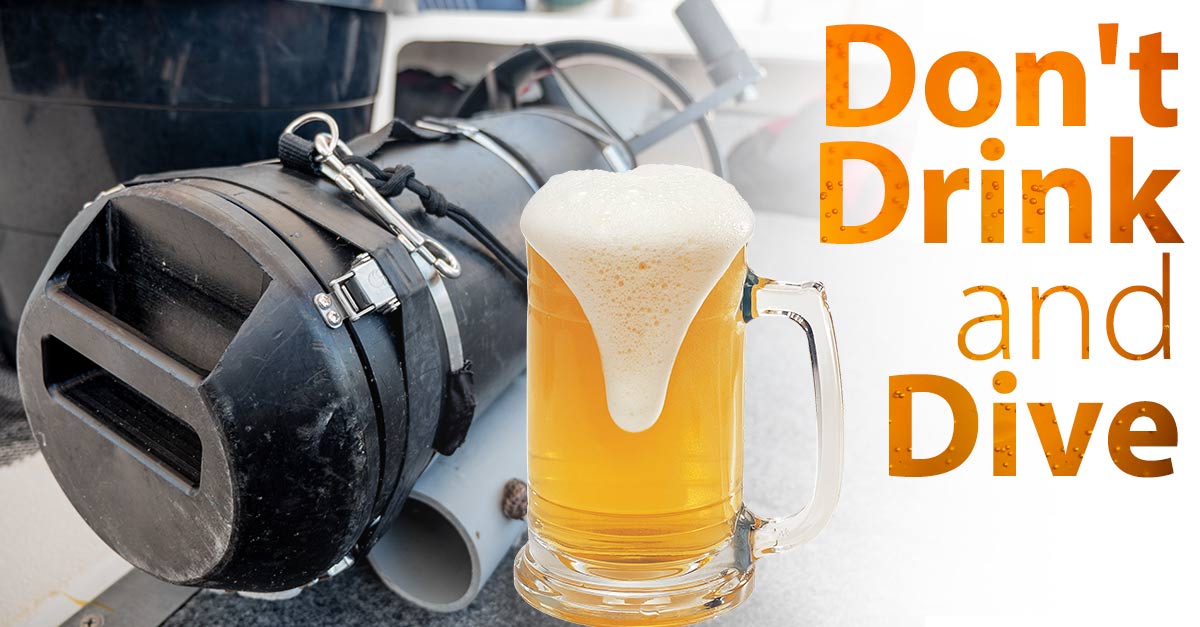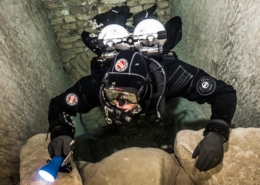Don’t Drink and Dive
By Stephen Phillips
It’s that time of the year when divers plan holidays or expeditions to many diving destinations all over the world. For many, this is a once-in-a-lifetime dream. It shouldn’t be a nightmare.
The whole experience revolves around diving and of course the social interaction with like-minded people, but we need to be responsible. As the old saying goes, “First drink/last dive.” It seems harsh, but would you drink and drive or use complicated machinery in your job under the influence of alcohol? Of course not. Diving is no different. There are a number of effects that can lead to bad consequences, both underwater and when we surface.
Really diving and consuming alcohol before after and during surface intervals do not go together. Alcohol affects the central nervous system. It impairs judgment and coordination. This reduces the ability to react and coordinate many skills and tasks we try to perform during our excursions underwater.
Diving whether Recreational or Tech we are exerting ourselves physically and mentally.
If an emergency happens, we need to act quickly. Studies looking at the effects of alcohol and performance have shown that a high percentage of all drowning incidents in adult males are associated with alcohol (Diving and Subaquatic Medicine, Edmunds C, et al.,2002)
Alcohol takes time for effects to subside and the body to metabolize alcohol and its effects to subside. Performing skills and thinking processes can be impaired by as little as a blood alcohol (BAC) of 0.04%. Put in laymen’s terms, this would be the BAC of an average 82 kg/180 lb adult male who drinks two, 12-ounce beers in a short period of time on an empty stomach. This was highlighted in a study by M.W.Perrine and colleagues. The study also found that, at lower levels, situational awareness and problem solving were impaired. Remember that, in a diving environment were awareness and problem solving are critical if an emergency occurs
In many of the courses we teach, dehydration, when severe, is most likely a major factor in decompression sickness (DCS). This may be caused by recent alcohol intake as well as seasickness, excessive sweating, the fact we are breathing dry air and diuresis from immersion. It has not been conclusively answered whether alcohol causes diver’s susceptibility to DCS due to only a few studies out there but that’s for another day and personally, I do not want to be that statistic.
Tech diving, in particular, is a section of diving where meticulous planning and skills are required given the depths sometimes attained. So it is in our interest and safety that we think carefully about alcohol consumption before and after these formal activities. Trimix lessens the effects of nitrogen narcosis on some deeper dives. However, this benefit can be offset by a high BAC. High blood alcohol levels may enhance the effects of nitrogen narcosis along with dehydration. This could lead to accidents because of poor problem-solving.
The bottom line is that diving and drinking alcohol do not go together.
The central nervous system is affected in such a way that judgment is impaired. Plus in fact, reaction times and coordination are reduced. This is not the best recipe for sport or tech diving. How many risk assessments do we see with alcohol consumption highlighted?
As divers we need to take a responsible approach to alcohol consumption. Not only before diving but afterward. Following a few simple rules will leave us with good memories, not ones we regret.
These rules are:
- Get a good night’s sleep. Anything up to eight hours or more.
- Limit alcohol consumption the night before to two or three, with a non-alcoholic drink between them.
- Drink plenty of water or sports drinks the morning of your dive. Being well-hydrated helps.
- Don’t drink on an empty stomach. A good meal helps slow the flow of alcohol into your system.
- Don’t forget to have a healthy breakfast on the morning of your dive.
I have covered only the tip of the iceberg here. There is a lot more information out there. They say knowledge helps us make the right decisions, so let’s be safe.










השאירו תגובה
רוצה להצטרף לדיון?תרגישו חופשי לתרום!